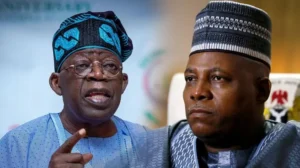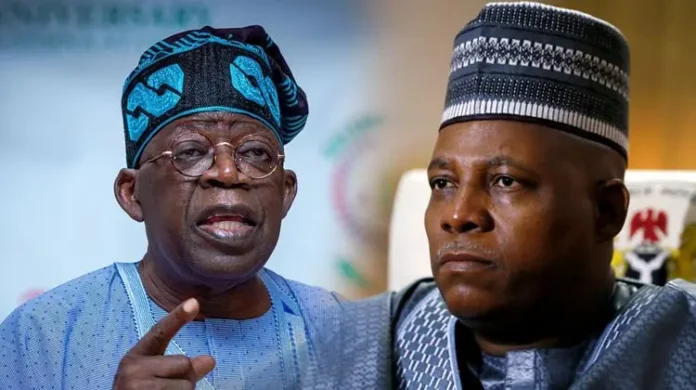On Thursday, Vice President Kashim Shettima extolled President Bola Tinubu’s economic reforms implemented over the past year as having “saved the life of the nation.” These words emphasize the substantial impact of Tinubu’s policies on Nigeria’s economic landscape and underscore the significance of proactive fiscal measures in bolstering national resilience.
 He described them as necessary, given the poor state of Nigeria when he assumed office on May 29, 2023.
He described them as necessary, given the poor state of Nigeria when he assumed office on May 29, 2023.
“His Excellency, President Bola Tinubu, chose the option that will save the life of the nation instead of one that will merely prolong its imminent and predicted economic death,” said Shettima when he appeared as the Guest Speaker at the Second Chronicle Roundtable in Abuja.
He explained why the administration acted on the petrol subsidy regime and the foreign exchange market intervention, saying the President chose the harshest but most certain path to recovery.
The Vice President affirmed that the Tinubu administration does not blame the previous regime for its decisions.
Shettimma implored Nigerians to be patient with the administration assuring them that Tinubu is steering the nation’s ship through economic turbulence and storms he encountered on taking office.
He expressed confidence that the measures taken so far would soon yield the desired results for the nation.
Nigeria’s economy is poised for significant growth once the sacrifices being made are overcome.
Diversification of the economy beyond oil, investment in critical infrastructure, fostering a favorable business environment, enhancing human capital development, and improving governance and transparency.
“Positive changes will soon be evident across all economic indicators – inflation, per capita income, GDP numbers, poverty reduction, food security, and all aspects close to the hearts of our people,” the VP predicted.
Shettima emphasised that the Tinubu-led government understands the reasons for the steps taken by the immediate past Buhari administration. Therefore, it does not blame it for the current economic hardship.
“We understood why our predecessor decided to remove the subsidy. We do not resort to blaming the previous administration. Leadership is about courage, leadership is about continuity, and leadership is about making far-reaching decisions.
“Before we took charge, the biggest issue was the fuel subsidy removal. We had to get rid of the subsidy or the subsidy would have destroyed the Nigerian nation, it was a bitter pill to swallow, but necessary.
“The government is a continuum. Whoever succeeded the previous government could either steer the ship through the storm as President Tinubu is doing or let the country implode,” he stated firmly.
Shettima cited Nigeria’s debt-service-to-revenue ratio which rose to 111.18 per cent before Tinubu assumed office describing it as “an economic death sentence.”
He highlighted the nation’s budget deficits, diversions of resources from critical sectors of the economy, and corruption masterminded by the subsidy regime saying, that since President Tinubu’s opponents in the 2023 elections, all promised to tackle these head-on, they cannot blame the government for taking the obvious steps.
“Fortunately, this is why some of our brothers and sisters who ran for this office could not question our methods.
“Whether in handling the subsidy matter or the FOREX crisis, we had also promised the solutions we adopted.
“Those who tried to backtrack were instantly proven wrong by data, history, and the facts,” he added.
However, the Vice President lamented the level of sabotage Nigeria’s economy had suffered at the hands of those he said were only concerned with personal gains over national interest.
He pointed at fuel subsidy beneficiaries and foreign currency speculators saying “Our colleagues in charge of the CBN, Mr. Yemi Cardoso, and the NSA, Nuhu Ribadu, had to take matters into their own hands.”
Shettima expressed confidence that some of the measures being administered would soon bring desired results for the nation.
Therefore, he implored Nigerians to be patient with the administration as the President steers the ship of state through the economic turbulence and storm he met on the ground.
The VP told critics of Tinubu’s economic policies that Nigeria’s recovery would not be achieved through a one-size-fits-all solution to the complexities facing individual nations.
He argued that every nation is forged out of its peculiar economic histories and contexts.
He cited the Argentine Solution suggested by the presidential candidate of the Peoples Democratic Party in the last election, Atiku Abubakar, noting that governance is not a photocopying machine.
“Sometime in February this year, a presidential candidate in the last election…rushed to point Argentina as a model for Nigeria.
“In barely two weeks, he watched as Argentina’s inflation rates soared, yet refused to acknowledge that every country’s journey is different.
“Every country is a product of its economic history and context. We respect what President Javier Milei does there and we wish him well, but governance is not the photocopying machine some of us believe it is”, he said.
Regionally, Shettima opined that Nigeria must get its acts together first before it can lead Africa into its projected growth revolution.
“The trajectory of global growth is facing Africa and Nigeria will make or mar that transition. It’s in our interest, it’s in the interest of the black man, for Nigeria to succeed.
“Excellencies, ladies and gentlemen, though humbly it might be, there’s no place like home. We have to unite, we have to fuse into one. Politics is over, we are now in the phase of governance.
“We need to move this nation forward, not for my own sake, not for the sake of the people on the high table, but for the sake of the black man. ”
Earlier in his opening remarks, the chairman of the Ministry of Finance Incorporated and former Finance Minister, Dr. Shamsudeen Usman, said the Renewed Hope Agenda of the Tinubu administration is a detailed and carefully crafted policy document.
However, he called for periodic review and integration into the medium and long-term development framework of the country.
Usman said policy consistency with a long-term vision to transform critical sectors of the economy, is the way to go.
Meanwhile, the CEO of 2nd Chronicle Newspaper, Mahmud Jega implored guests to critically analyse government policies and programmes.
Jega said critical analysis by the media but is necessary to collectively contribute to the nation’s development.
Also, present at the event were the Minister of Information, Mohammed Idris; Special Adviser to the Vice President on Political Matters, Dr. Hakeem Ahmed; Chairman of 21st Century Chronicle, Gbara Awanen, Senior Special Assistant to former President Muhammadu Buhari, Garba Shehu and notable leaders in the media industry such as Dr. Ishaq Kawu; Mr. Segun Adeniyi, among others.




